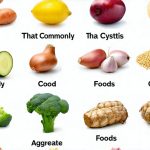Prostatitis, inflammation of the prostate gland, can cause significant discomfort and disruption to daily life. While treatment typically involves medication prescribed by a healthcare professional, dietary adjustments can often play a supportive role in managing symptoms. Understanding which foods might exacerbate prostatitis symptoms is crucial for individuals seeking relief and improved well-being. This article aims to provide a detailed overview of foods that may potentially aggravate prostate inflammation and discomfort, offering insights into making informed dietary choices.
It’s important to remember that individual responses to food can vary greatly. What triggers symptoms in one person might not affect another. Paying attention to your own body and identifying personal triggers is key. This information should be viewed as a starting point for discussion with your healthcare provider or a registered dietitian, who can provide personalized guidance based on your specific condition and needs.
Dietary Considerations & Prostatitis
Diet plays a vital role in overall health, and this extends to prostate health. Certain foods may contribute to inflammation or irritate the bladder, potentially worsening prostatitis symptoms like pain, frequent urination, and urgency. Identifying these potential triggers can empower individuals to make proactive dietary changes to support their comfort. A balanced diet rich in anti-inflammatory foods is generally recommended, but knowing what to limit or avoid is equally important.
Focusing on a holistic approach that combines medical treatment with mindful dietary choices often yields the best results for managing prostatitis symptoms and improving quality of life.
Foods To Be Mindful Of
Spicy Foods & Irritants
Spicy foods contain capsaicin, a compound known to irritate the bladder and urinary tract in some individuals. This irritation can exacerbate prostatitis symptoms, particularly urgency and burning sensations during urination. Common culprits include chili peppers, hot sauces, curry powders containing significant spice levels, and heavily seasoned dishes. While not everyone reacts to spicy food, those experiencing prostatitis symptoms should consider reducing or eliminating them from their diet to see if it provides relief.
Beyond capsaicin, other irritants like excessive black pepper, horseradish, and mustard can have similar effects on the urinary tract. It’s often helpful to experiment with gradually reintroducing these foods after a period of elimination to determine individual tolerance levels.
Caffeine & Alcohol
Both caffeine and alcohol are diuretics, meaning they increase urine production. While staying hydrated is important, excessive diuretic consumption can overstimulate the bladder, leading to increased frequency and urgency – symptoms commonly associated with prostatitis. Furthermore, alcohol can irritate the prostate gland itself, potentially intensifying inflammation and pain.
Caffeine is found in coffee, tea, soda, energy drinks, and even some medications. Alcohol is present in beer, wine, and spirits. Moderation or complete avoidance of these beverages may be beneficial for managing symptoms. Consider switching to herbal teas or water as alternatives.
High-Acid Foods & Beverages
High acidity can irritate the bladder and urinary tract, similar to spicy foods. Citrus fruits (oranges, lemons, grapefruit), tomatoes and tomato-based products (sauces, juices), vinegar, and carbonated beverages are all examples of acidic foods that may aggravate prostatitis symptoms in sensitive individuals. The acidity can cause discomfort during urination and potentially worsen inflammation.
Maintaining a more alkaline diet – incorporating more vegetables, fruits with lower acidity levels (like bananas and pears), and whole grains – might help neutralize the effects of these acidic foods. However, it’s essential to balance this approach and ensure adequate nutrient intake from diverse sources.
It is crucial to emphasize that these are potential triggers, and individual responses vary significantly. Keeping a food diary to track what you eat and how your symptoms respond can be incredibly helpful in identifying personal sensitivities. This information will assist you and your healthcare provider in developing a dietary plan tailored to your specific needs and circumstances. Remember to always consult with a medical professional for accurate diagnosis and personalized treatment recommendations related to prostatitis.





















